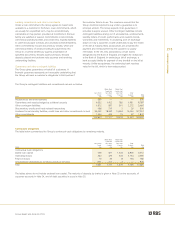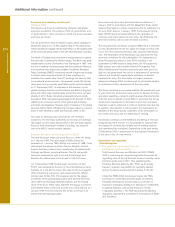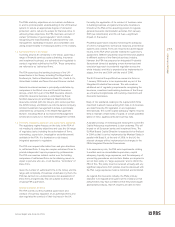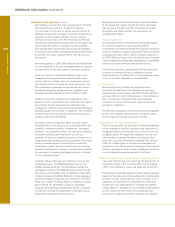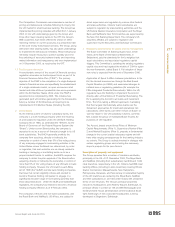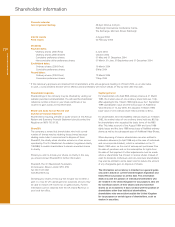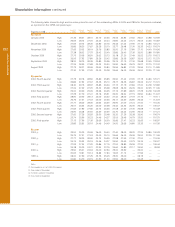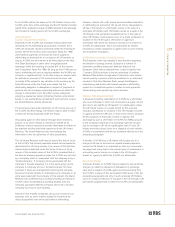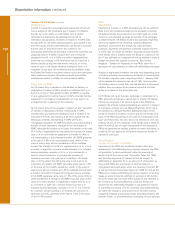RBS 2003 Annual Report Download - page 225
Download and view the complete annual report
Please find page 225 of the 2003 RBS annual report below. You can navigate through the pages in the report by either clicking on the pages listed below, or by using the keyword search tool below to find specific information within the annual report.
223
Annual Report and Accounts 2003
Shareholder information
Memorandum and articles of association
A summary of certain terms of the company’s Memorandum of
Association (the “Memorandum”) and Articles of Association
(the “Articles”) as in effect at the date of this annual report and
certain relevant provisions of the Companies Act 1985, as
amended (the “Act”) as relevant to the holders of any class of
share is contained in the company’s Report and Accounts
2002 incorporating the Annual Report on Form 20-F for the
year ended 31 December 2002, which summary is
incorporated by reference into this annual report. The
summary description is qualified in its entirety by reference to
the terms and provisions of the Memorandum and Articles. The
Memorandum and Articles are registered with the Registrar of
Companies of Scotland. Holders of any class of share are
encouraged to read the full Memorandum and Articles, which
have been filed with the SEC.
Taxation for US Holders
The following discussion summarises certain US federal and
UK tax consequences of the acquisition, ownership and
disposition of non-cumulative dollar preference shares, ADSs,
X-CAPs or PROs by a beneficial owner that is a citizen or
resident of the United States or that otherwise will be subject
to US federal income tax on a net income basis in respect of
the non-cumulative dollar preference shares, X-CAPs, ADSs or
PROs (a “US Holder”). This summary assumes that a US
Holder is holding non-cumulative dollar preference shares,
ADSs evidenced by ADRs, X-CAPs or PROs, as applicable, as
capital assets. This summary does not address the tax
consequences to a US Holder (i) that is resident (or, in the case
of an individual, ordinarily resident) in the UK for UK tax purposes
or, generally, (ii) that is a corporation which alone or together
with one or more associated companies, controls, directly or
indirectly, 10% or more of the voting stock of the company.
The statements and practices set forth below regarding US
and UK tax laws (including the US/UK double taxation
convention relating to income and capital gains) which entered
into force on 31 March 2003 (the “New Treaty”), the prior
US/UK double tax convention relating to income and capital
gains (the “Prior Treaty”) and the US/UK double taxation
convention relating to estate and gift taxes (the “Estate Tax
Treaty”) are based (i) on those laws and practices as in force
and as applied in practice on the date of this Report and (ii) in
part, on representations of the depository, and the assumption
that each obligation in the Deposit Agreement and any related
agreement will be performed in accordance with its terms. The
US Treasury has expressed concerns that parties to whom
ADRs are pre-released may be taking actions that are
inconsistent with the claiming, by US Holders of ADRs, of
foreign tax credits for US federal income tax purposes.
Accordingly, the analysis of the creditability of UK taxes
described below could be affected by future actions that may
be taken by the US Treasury. This summary is not exhaustive of
all possible tax considerations and holders are advised to
satisfy themselves as to the overall tax consequences,
including specifically the consequences under US federal,
state, local and other laws, and possible changes in taxation
law, of the acquisition, ownership and disposition of non-
cumulative dollar preference shares, ADSs evidenced by
ADRs, X-CAPs or PROs by consulting their own tax advisers.
References below to “the Treaty” are references to either the
Prior Treaty or the New Treaty as applicable.
For the purposes of the New Treaty and the Estate Tax Treaty
and for purposes of the US Internal Revenue Code of 1986,
as amended (the “Code”), US Holders of ADRs will be treated
as owners of the non-cumulative dollar preference shares
underlying such ADRs.
Preference shares or ADSs evidenced by ADRs
Taxation of dividends
The company is not required to withhold tax at source from
dividend payments it makes or from any amount (including any
amounts in respect of accrued dividends) distributed by the
company.
Subject to applicable limitations that may vary depending upon
a holder’s individual circumstances, dividends to noncorporate
US Holders in taxable years beginning before 1 January 2009
will be taxable at a maximum tax rate of 15%. Noncorporate
US Holders should consult their own tax advisers to determine
whether they are subject to any special rules that limit their
ability to be taxed at this favourable rate.
The New Treaty applies to dividend payments after 1 May
2003. If a US Holder would have been entitled to greater
benefits under the Prior Treaty, that US Holder may elect to
continue to apply the Prior Treaty until 1 May 2004.
New Treaty
Because payments of dividends by the company to non-UK
investors are not subject to UK withholding tax, it is not
necessary to apply the New Treaty in order to receive a
reduced rate of withholding. Since there is no UK withholding
tax on payments of dividends to US Holders, US Holders will
not be entitled to a foreign tax credit for foreign taxes paid as a
result of the payment of dividends by the company.
Prior Treaty – effect of UK tax credit
An individual shareholder who is resident in the UK for UK tax
purposes and who receives a dividend from the company is
entitled to claim a tax credit in the UK against its income tax
liability attributable to the dividend. Although a US Holder that
receives a dividend from the company will not be entitled to
this UK tax credit, under the Prior Treaty, certain US Holders
may treat an amount equal to this credit (the “Tax Credit
Amount”) as a tax paid to the UK taxing authorities, for which
such US Holder may claim a US foreign tax credit. A US
Holder that makes that election described above must include
the Tax Credit Amount in its income and will generally be
entitled, subject to certain limitations, to a credit against its US
federal income tax liability equal to the Tax Credit Amount.
For foreign tax credit purposes, dividends paid by the
company with respect to the non-cumulative dollar preference
shares (and any Tax Credit Amount Included) will generally
constitute ‘passive income’ or, in the case of certain US
Holders, ‘financial services income’.


